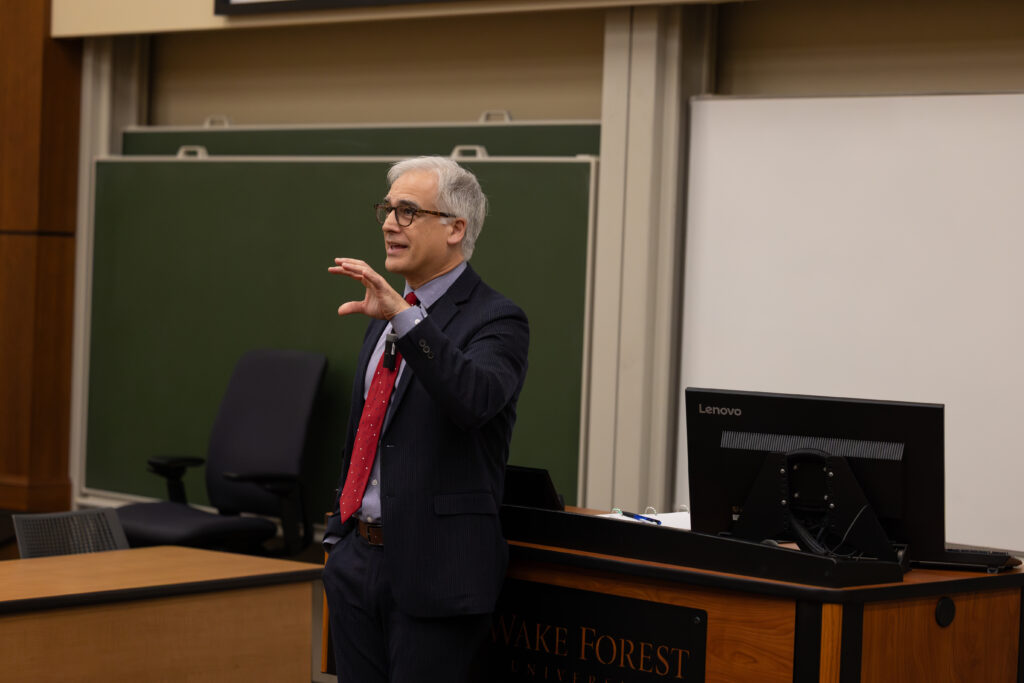Professor Jonathan Cardi Appointed to Judge Donald L. Smith Professor of Law
For Professor Jonathan Cardi, the path to where he is today has been full of rich and varied experiences. Recently appointed the Judge Donald L. Smith Professor of Law, his career trajectory has taken many twists and turns—from clerking for the Honorable Judge Alan Norris at the US Federal Court of Appeals for the 6th Circuit, to working as a litigator at a DC law firm, to transitioning into academia as a professor of law.

And his scholarly focus has been no exception. “When I got into teaching, I planned to be a copyright scholar,” says Professor Cardi. During his time at Arnold & Porter, he primarily worked on music copyright cases, and his research focused on music copyright. But in his first year of teaching, as fate would have it, he attended an American Law Institute (ALI) meeting on the torts restatement. “That was a transformative experience,” he says, “That was it, I was hooked. I knew torts was where I wanted to devote my time and energy.”
“Torts is traditionally a place where deep thinking happens,” Professor Cardi says. “The cases touch on interesting societal questions—like sexual consent and strict liability. In other words, how do we balance social developments with the need to protect people?” Indeed, many great legal philosophers—from Aristotle to Jules Coleman—have ruminated on torts issues.
That first ALI meeting not only set Professor Cardi on a course to torts scholarship, it also proved to be the stepping stone for one of his proudest scholarly accomplishments. “To this day, I don’t know why ALI I asked me to be an Associate Reporter for the Restatement Third of the Torts,” he says. “It has been the most amazing scholarly experience of my life. No other type of scholarship that I could have written would have as much impact on the law.”
As a Reporter, he was tasked with compiling all of the cases within his area of the law, distilling those cases into overarching “black-letter rules,” and providing a detailed discussion and analysis for each. The complexity and breadth of the work that goes into this process is tremendous. In addition to the countless scholarly lessons he learned throughout his time as a Reporter, Professor Cardi also learned important political lessons. “Writing a restatement for approval by a body of 4,000 incredibly accomplished, intelligent people with different backgrounds, experience, and political leanings is very challenging,” he says. “It really is about threading the needle, just so.”
While torts is always at the foundation of his work, Professor Cardi’s tort scholarship manifests in many ways. His latest interest is on the intersection of race, social science, and the law. “When it comes to tort law, very few people are writing in this area,” he says. His most recent paper on the subject, “Do Black Injuries Matter?: Implicit Bias and Jury Decision Making in Tort Cases,” written in collaboration with Professor Valerie Hans (Cornell Law School) and Wake Forest Law Professor Gregory Parks, explores the interactions between the race of jurors, the race of the parties, and implicit racial bias of jurors vis-a-vis tort outcomes (i.e., plaintiff vs. defendant winning, amount of damages). After conducting empirical research on 1,300 subjects, Professor Cardi’s conclusion was: “Unsurprisingly, it’s complicated.”
He continues: “We found that differences in outcomes based on race or racial bias typically came down to individual fact differences that link to possible stereotypes, or whether the defendant is an institution or an individual. And of course, these are things you need to delve deeply into in order to root out insidious effects. It’s all very nuanced.”
While his scholarship has flourished, Professor Cardi has continued to embody the Wake Forest ideal of a “teacher-scholar.” A dedicated teacher who has devoted much of his career to his students, he especially enjoys working with students who may be struggling. “Helping students realize that the struggle to understand a concept is the goal—that’s where real learning happens—is what law school is all about,” he says. “There’s no better feeling than guiding a student to that ‘lightbulb moment.’” For Professor Cardi, it’s especially gratifying when he sees a student gain confidence in themselves through the support and encouragement of their professors. “Watching students transform and grow throughout their time at law school is what makes teaching such a joy.”
And for Professor Cardi, there has been no better environment to teach in than Wake Forest Law. “We bill ourselves as a place with a strong sense of community that prioritizes the student/professor relationship and the student/staff relationship,” he says. “So inevitably we attract people who are also looking to foster that relationship and contribute to the community.” Having been involved in many hiring cycles over his nearly 15 years at the Law School, Professor Cardi is proud of the way the faculty and staff value people. “We care about people here,” he says. “Not just their credentials or degrees, but who they are. And as a result, we have an amazing community.”
So what’s next for Professor Cardi? “I’m continually thinking about what is going to fulfill me in the next stage of my career,” he says. “And I’m constantly asking ‘how can I affirmatively shape that, as opposed to just being reactive?’”
Regardless of where his journey takes him next, Professor Cardi is certain of one thing: “When you have a blank page, it’s up to you to fill that page in meaningful ways. To be in a position where I can do that is an honor and a privilege.”
Categories: Our People